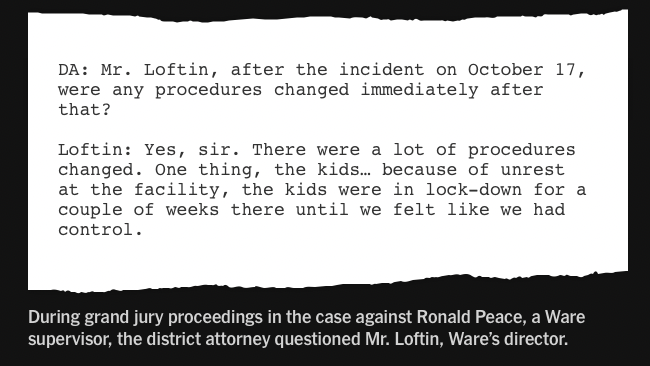
1/ After back-to-back suicides at a juvenile detention center in Louisiana in 2019, @rachel_muel & I spent 3 yrs trying to understand how those deaths could happen. What we found was evidence of abuse, overlooked complaints and a surge in suicide attempts
nyti.ms/3zu5wCL
nyti.ms/3zu5wCL
2/ We learned that kids had been on lockdown for 23 hours a day. We learned of guards who withheld sanitary pads, bribed kids to beat up other kids, and committed physical and sexual abuse. We learned that Ware leaders repeatedly failed to take allegations seriously. 

3/ Shakira Williams was 16 when a Ware guard came into her room and kissed her. She said she endured ongoing sexual abuse because she was hungry and the guard brought her food. “You’ve got to survive,” she told us. Her story echoed many others’, including use of food as leverage. 

4/ Allegations are met with skepticism outside Ware, too. The head of criminal investigations in the sheriff’s office said the kids couldn't be believed bc they “come from all over the place, from down south, New Orleans, Baton Rouge. They’re different, they’re a lot rougher.”
5/ Many of the kids at Ware do come from urban areas hours away. And about 3/4 of children held there are Black - emblematic of the system’s racial imbalances. The abuse, too, embodies the chronic dysfunctions of America’s juvenile justice systems.
6/ Records offer no evidence that state regulators have ever fined or punished Ware, even as inspectors have documented the same failings year after year. Five months after the back-to-back suicides, Ware was awarded a $450,000 contract to supervise at-risk youth.
7/ For more on this story, check out “8 Days at Ware” a 26-minute documentary that @rachel_muel and I directed and produced at @Berkeleyjournalism.
We are grateful to everyone who shared their stories for the film and the entire investigation. 8daysatware.com
We are grateful to everyone who shared their stories for the film and the entire investigation. 8daysatware.com

8/ There are many to thank, but first this wouldn’t have happened without the collab between @UCBerkeleyIRP & @BerkeleyLawPAC, which supported my embed as a journalist reporting on juvenile justice. Thank you to @nytimes & @FundFIJ. And to my team @rachel_muel & @DavidBarstow 🙏🏻
• • •
Missing some Tweet in this thread? You can try to
force a refresh




